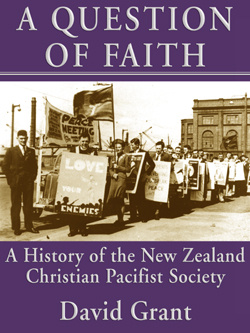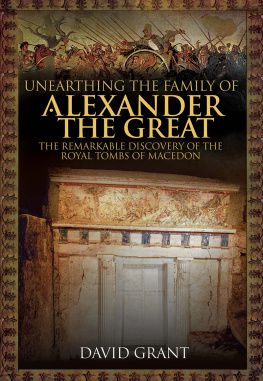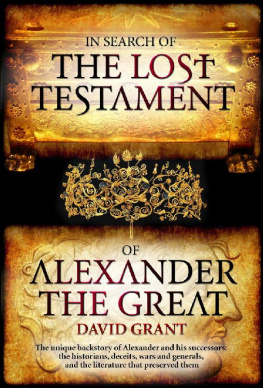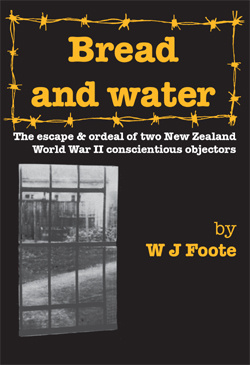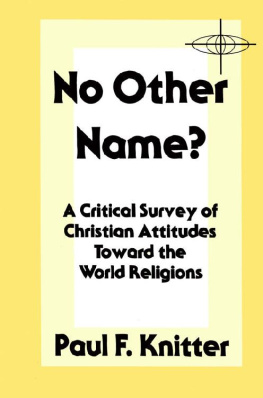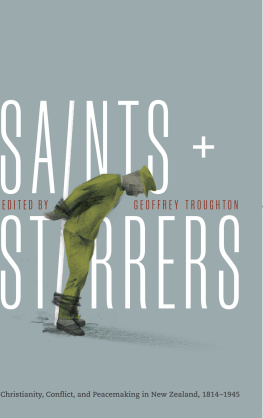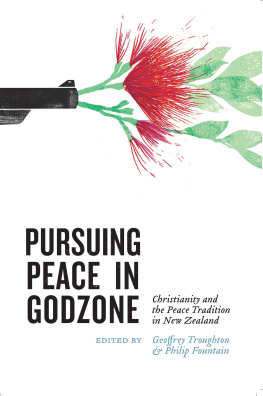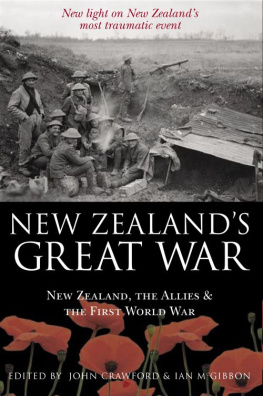A Question of Faith
A History of the New Zealand Christian Pacifist Society
David Grant
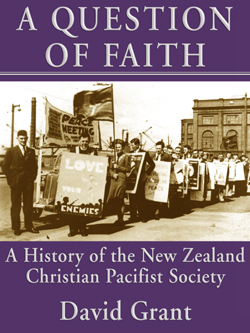
Copyright 2013 David Grant
Smashwords edition
First published in print format 2004
by Philip Garside Publishing Ltd.
All rights reserved. This book or any portion thereof may not be reproduced or used in any manner whatsoever without the express written permission of the publisher except for the use of brief quotations in a book review.
This ebook is licensed for your personal enjoyment only. This ebook may not be re-sold or given away to other people. If you would like to share this book with another person, please purchase an additional copy for each recipient. If you are reading this book and did not purchase it, or it was not purchased for your use only, then please purchase your own copy. Thank you for respecting the hard work of this author.
* * * * *
On the evening of 2 June 1941, Christian Pacifist Society activist, Presbyterian Minister and well-known poet Basil Dowling mounted the drinking fountain in Wellingtons Pigeon Park to commence a public denunciation of war. Like those before him he faced certain arrest and imprisonment. When he later wrote on why he tried to attempt the improbable he began his explanation by stating that it was, simply a question of faith.
* * * * *
Acknowledgements for 2004 edition
Photos and documents pictured are from the authors collection, except where otherwise noted.
Front cover photograph:
Ormond Burton leads the Christian Pacifist Society Poster parade in Wellington 1940
The publishers gratefully acknowledge the generous bequest by Bruce Barnitt which has made this history possible.
A portion of proceeds from the sale of this book will be donated to support the ongoing work of The Peace Foundation (New Zealand).
* * * * *
ISBN 978-1-927260-10-4
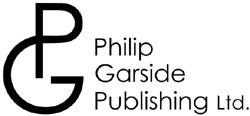
Philip Garside Publishing Ltd
PO Box 17160
Wellington 6147
New Zealand
books@pgpl.co.nz
www.pgpl.co.nz
Table of Contents
Introduction
Before 1981, I had never heard of the Christian Pacifist Society. That year I returned to university to undertake a masters degree in history before returning to my teaching position at South Aucklands Tangaroa College. One of the papers in the Auckland University history facultys M.A. course was an oral history project on a topic of the students choice. Through community social work I had learnt that Neil Smith, then community advisor for Ponsonby on the Auckland City Council, had been a conscientious objector on religious and humanitarian grounds during the Second World War. I chose to undertake conscientious objection during this war as my topic and on 4 June 1981 interviewed Neil Smith.
Such was my fascination with Neils memories of his experiences and thoughts about reasons for his incarceration (which included the first slivers of information on the Christian Pacifist Society) I determined that I would take a second years leave from my teaching position and undertake a thesis examining a related topic a history of anti-militarist movements before and during the Second World War in New Zealand, including, of course, the Christian Pacifist Society. I was keen not so much on a higher degree but knew that there was an interesting book publication lurking among all the intriguing information now at my disposal, which had not been written about publicly before. As it transpired, material from both my oral history project, (Conscientious Objection During World War Two: An Oral Perspective) and the thesis, (To Turn The Other Cheek: A History of Anti-Militarism in New Zealand Before and During World War Two), as well as some new data, evolved into Out In The Cold: Pacifists and Conscientious Objectors in New Zealand During World Two published by Reed Methuen in June 1986.
Of the 16 men I interviewed for the oral history project four of them Mervyn Browne, Jack Hamerton, Ron Howell and Neil Smith were, or had been members of the Christian Pacifist Society. I spread my net much wider during the research for my thesis and I conducted interviews with A C Barrington, Arthur Carman, Ron Howell (again), Merle Hyland, Read Mason, Muriel and John Morrison, Chris Palmer, Alun Richards and Thurlow Thompson, with correspondence to and from Barrington, Millicent Baxter, Morva Efford and Bert Worboys. I also perused Barrington and Ormond Burtons papers in the Alexander Turnbull Library and waded through some of Burtons massive unpublished autobiography A Rich Old Man . I also read his Shall We Fight (1923), Into The Way Of Peace (1950) and Percy Paris (1963); Howells Christian Pacifism and Social Change (1945) and Barringtons Trials of a Pacifist (1970). Allan Handyside and Jim Doherty were kind enough to loan me drafts of memoirs of their time as wartime conscientious objectors to use without condition.
For Out In The Cold , I extended the net still further, having conversation or correspondence with Bruce Barnitt, Charlie and Stan Bickers, Edith and John Boal, Les Clements, Lindsay Crozier, Bill Kelly, Jean and Jack Rogers, Ron Scarlett and Connie Summers while renewing acquaintances with A C Barrington, Merv and Marjorie Browne, Jack Hamerton, Allan Handyside, Jim Doherty, Chris Palmer and Neil Smith. I enjoyed being able to attend some of the Societys 50th birthday celebrations in Wellington in 1986, taking particular pleasure in reliving with Connie Summers, Jim Doherty, Jack Hamerton and Dave Silvester their experiences as Christian pacifist street speakers in Pigeon Park in 1941.
In a conversation with Jack Rogers at his Halswell home early in 2003, I learned of the demise of the Christian Pacifist Society and with the help of the generous bequest that Bruce Barnitt had made to the Society in his will in 1990, a contract was signed with Jack (as treasurer), Reverend Barry Harkness (as secretary) and Richard Thompson ( Peacemaker editor), the last three activists within the organisation, for me to research and write its history. This is the result. It has been my pleasure to have known many men and women who are, or who have been members of this organisation through the course of all four of the projects that I have been associated with, many of whom having since passed away. I want to acknowledge in particular, enduring friendships with Marjorie and Merv Browne and Jean and Jack Rogers.
I wish to thank Jean and Chris Palmer, Joy Cole and Merle Hyland for comments on chapters seven and eight; and Barry Harkness, Jack Rogers and Richard Thompson for comments on chapters eight, nine and ten. I wrote this book while a Fellow of the Stout Research Centre of Victoria University in Wellington and I would like to acknowledge the hospitality of the Centres director, Dr Lydia Wevers, and the collegiality of the other fellows resident during my tenure there. I am also grateful to Philip Garside for publishing the book and for the high standard of his production.
David Grant
January 2004
1 Antecedents
Christian peace activists established the New Zealand Christian Pacifist Society in 1936 but such a movement had origins many years before that. The first flowerings of anti-militarist dissent in this country came in response to the 1909 Defence Bill which led to the first-ever introduction of compulsory military training in New Zealand two years later. This legislation, which required the compulsory registering of all males between the ages of 12 and 30 (called boy conscription by critics), and immediate territorial training for all those between 18 and 21, led to the formation of three protest groups, one of which had a distinctly Christian ethos.

